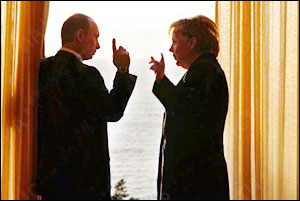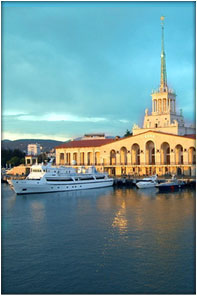This program has been developed as a unique educational site in Russia (Sochi) that sets the study of Russian as a foreign language within an interdisciplinary program that explores theory and practice of interpersonal and cross-cultural communication. The program is open to students with and without knowledge of Russian, as long as they are interested in the topics of social interaction and communication barriers. The program offers a rich international educational and research experience for UW students from a variety of disciplines (political science, ecology, sociolinguistics, history, anthropology, business, medical sciences and global health).

Palm trees and a subtropical climate do not usually come to mind when one hears the word "Russia." Just visiting Sochi would dispel the stereotype "Russia: ice and snow," even though Sochi has recently won the right to host Winter Olympics 2014. The city stretches along the Black Sea shoreline beneath the foot of the Caucasus Mountains and covers a part of the unique National Park inscribed by UNESCO as a World Heritage site. This is a beautiful place where Russia's rulers (from Stalin to Putin and Medvedev) like to have their summer residences. Sochi has been a national health and recreation center since Soviet times. The city managed to keep some of its famous health institutions after the fall of the Soviet Union, when many sanatoriums fell into neglect or were restructured to join in the rapid development of tourist business. From 2000 on, Sochi began to regain its former health center status. By now its population of 400.000 receives additional 3 million visitors representing all strata of Russian society. Located in the part of Russia between Georgia and Ukraine, Sochi displays rich demographic and ethnic diversity (over 100 nationalities and ethnic groups), which makes it an ideal place for studying cross-cultural communication and social interaction.
As a rapidly developing site for the Olympics 2014, supported by President Putin through substantial government funds, Sochi has set top standards for world health resorts, model sports facilities and ecologically sensitive transport infrastructure. According to the official Sochi website, the comprehensive development outline also includes retraining Sochi health personnel in ways of communicating with patients along the Western civil society standards. Our enquiry into the communicative/ interactional differences would dovetail with Sochi's needs and would open venues for mutually beneficial partnership.
Two major universities in Sochi have expressed their willingness to develop educational partnerships with the UW. The project will take advantage of a truly unique opportunity for such a partnership: this is the time when Sochi is trying to figure out how to meet the high goals while struggling with a Soviet legacy and fierce business competition.
Students with and without knowledge of Russian will aim to ascertain specifically Russian ways of interpersonal interaction that differ from familiar patterns, thus potentially causing cross-cultural communicative failures. Both groups will be engaged in intensive field-work. Students without knowledge of Russian will use interpreters (interns from Sochi universities) and will participate in survival Russian mini-course.
The basic methodological concepts draw on studies in Conversation Analysis, or CA (Sacks, Schsegloff, Zemskaia), Transactional Discourse Model (Yokoyama), Cultural Scripts and Routines/Styles (Wierzbicka, Pesman, Gumperz), and Non-verbal Communication (Heritage, Kreidlin, McNeill). The framework will allow us to address interdependence between discourse settings, social roles of the participants and linguistic variations in formal/informal modes of natural conversations in institutional settings.
(following the UW rules on human subjects)
(1) Audio and video recordings of Institutional Interactions (following a large body of research in CA). (2) Investigation of "backchannel responses," ranging from non-verbal (e.g. head nods and postural shifts) to verbal. They betray hesitations, rapport-building strategies, shifts in perception of one another's identity and more. This is a rich site for investigation of "cultural scripts." (3) Follow-up individual interviews with the participants and interpreters.

Students will be brought in contact with local educators in the students' respected fields, to outline the area of inquiry and meet with people and agencies outside the university. A portion of topics and programs to be developed and delivered will be generated within a partnership model between the UW faculty and students and the Russia-based educational partners. The students will be able to inquire into topics of interest while collecting the data on the communicative practices of the Russians. Working with interpreters, the students will be looking for differences in situational expectations ("cultural scripts"), non-verbal signals (posture, proximity, direction of gaze, turn-taking routines and facial expressions) and the communicative effects they produce. Cultural analysis guided by UW faculty will deal with rich double-lens data: what is said in Russian, how it is translated into English by the Russian interpreters, and how it is understood by the students. Students from both groups will exchange data and use them for written reports.
For students with at least two years of college Russian the project offers a unique opportunity to study Russian as a foreign language while engaging in research in the area of communication. Along with traditional language instruction classes, a seminar in socio-cultural aspects of Russian will be offered, with an overview of structures expressing attitude, emotions and point of view at all levels of language, from phonetics and morphology to intonation and syntax. The seminar will also provide direction for special projects and assign field-work for exploring institutional interactions that will result in weekly oral reports and the written term-paper (in Russian). The major sites for field will be educational institutions of Sochi, from pre-schools to universities. Students will observe teacher-student interactions, school "protocols" and use of Russian not mentioned in textbooks.
Time-line: Aug. 24- Sept. 12. Prior to the trip, there will be 3 days of orientation that will equip the students with a general outline of the history and culture of the region and the research methods in conversation analysis and institutional face-to-face interaction.







 Palm trees and a subtropical climate do not usually come to mind when one hears the word "Russia." Just visiting Sochi would dispel the stereotype "Russia: ice and snow," even though Sochi has recently won the right to host Winter Olympics 2014. The city stretches along the Black Sea shoreline beneath the foot of the Caucasus Mountains and covers a part of the unique National Park inscribed by UNESCO as a World Heritage site. This is a beautiful place where Russia's rulers (from Stalin to Putin and Medvedev) like to have their summer residences. Sochi has been a national health and recreation center since Soviet times. The city managed to keep some of its famous health institutions after the fall of the Soviet Union, when many sanatoriums fell into neglect or were restructured to join in the rapid development of tourist business. From 2000 on, Sochi began to regain its former health center status. By now its population of 400.000 receives additional 3 million visitors representing all strata of Russian society. Located in the part of Russia between Georgia and Ukraine, Sochi displays rich demographic and ethnic diversity (over 100 nationalities and ethnic groups), which makes it an ideal place for studying cross-cultural communication and social interaction.
Palm trees and a subtropical climate do not usually come to mind when one hears the word "Russia." Just visiting Sochi would dispel the stereotype "Russia: ice and snow," even though Sochi has recently won the right to host Winter Olympics 2014. The city stretches along the Black Sea shoreline beneath the foot of the Caucasus Mountains and covers a part of the unique National Park inscribed by UNESCO as a World Heritage site. This is a beautiful place where Russia's rulers (from Stalin to Putin and Medvedev) like to have their summer residences. Sochi has been a national health and recreation center since Soviet times. The city managed to keep some of its famous health institutions after the fall of the Soviet Union, when many sanatoriums fell into neglect or were restructured to join in the rapid development of tourist business. From 2000 on, Sochi began to regain its former health center status. By now its population of 400.000 receives additional 3 million visitors representing all strata of Russian society. Located in the part of Russia between Georgia and Ukraine, Sochi displays rich demographic and ethnic diversity (over 100 nationalities and ethnic groups), which makes it an ideal place for studying cross-cultural communication and social interaction.  Students will be brought in contact with local educators in the students' respected fields, to outline the area of inquiry and meet with people and agencies outside the university. A portion of topics and programs to be developed and delivered will be generated within a partnership model between the UW faculty and students and the Russia-based educational partners. The students will be able to inquire into topics of interest while collecting the data on the communicative practices of the Russians. Working with interpreters, the students will be looking for differences in situational expectations ("cultural scripts"), non-verbal signals (posture, proximity, direction of gaze, turn-taking routines and facial expressions) and the communicative effects they produce. Cultural analysis guided by UW faculty will deal with rich double-lens data: what is said in Russian, how it is translated into English by the Russian interpreters, and how it is understood by the students. Students from both groups will exchange data and use them for written reports.
Students will be brought in contact with local educators in the students' respected fields, to outline the area of inquiry and meet with people and agencies outside the university. A portion of topics and programs to be developed and delivered will be generated within a partnership model between the UW faculty and students and the Russia-based educational partners. The students will be able to inquire into topics of interest while collecting the data on the communicative practices of the Russians. Working with interpreters, the students will be looking for differences in situational expectations ("cultural scripts"), non-verbal signals (posture, proximity, direction of gaze, turn-taking routines and facial expressions) and the communicative effects they produce. Cultural analysis guided by UW faculty will deal with rich double-lens data: what is said in Russian, how it is translated into English by the Russian interpreters, and how it is understood by the students. Students from both groups will exchange data and use them for written reports.